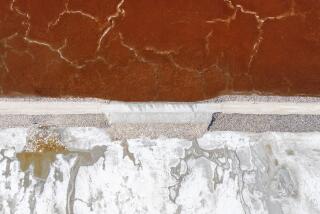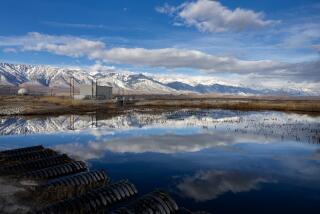We Need a Drought Scare Before It’s a Horror Story
- Share via
People can sit around for hours and one-up you on traffic horror stories, such as how long it takes them at rush hour to get from San Clemente to Irvine or from Newport Beach to Anaheim. When it comes to tales from the crypt, there’s nothing like a good 405 story to curdle the blood.
But let the conversation turn to water and watch things, shall we say, dry up.
Stan Sprague wouldn’t mind seeing a little controlled terror out there over the Southern California drought. Nothing to scare you out of your wits, but at least some recognition that a serious bogey man lurks.
“I might have used the term a few years ago that we’re in hot water,” Sprague said in his office Friday. “I might now say that we’re in hot , but there’s no water to be in.”
Sprague is the general manager of the Municipal Water District of Orange County, which has already asked its members for 10% reductions on water use. The district probably will ask for more cuts this week, along the lines of the 20% cut ordered last week by the Metropolitan Water District.
To Sprague, this is the water-use equivalent of being stuck in traffic at the El Toro Y.
“I think people are starting to get the idea that we do have a serious problem, but I also think there’s a certain level of skepticism, a concern for fairness and maybe a level of frustration.”
That frustration comes from people being unsure what it takes to make the necessary reductions. If they knew how simple it is, Sprague said, they wouldn’t be nearly as worried.
Nearly half of the water that goes through the water meter is used outside the home, either for lawns and shrubs or things like washing the car. If you can cut your outside water usage in half, Sprague said, you can do your part in hitting the overall 20% reduction.
Sprague knows there’s a long way to go to get people accustomed to conserving water. He’s got a neighbor who waters his lawn every morning and now has a tree with roots that are buckling the sidewalk and growing so high it’s hiding the house. A classic case of over-watering, Sprague said.
The public needs to recall its energy-reduction mentality of the ‘70s. Remember when people actually drove less and office buildings conserved electricity? Unfortunately, we all know how long that lasted.
“What we have to do is going to take time, but the other fear I have is that we will go back to business as usual once we get out of this drought,” Sprague said. He has a vision of a “water conservation ethic” that takes hold among the populace--an ethic that will affect all levels of society.
Sprague is even willing to talk a little heresy.
“Maybe the drought could possibly be the best time to just turn the water off to some of our parks because they have the wrong type of grass for Southern California, where we’re trying to conserve water,” he said. “They ought to just let their parks die and when we do have some water again, go in and plant some grasses that are more compatible with our environment.”
Sprague said he doesn’t mean that to sound as harsh as it does, but it underscores his point that a new mind-set needs to kick in.
Sprague would like to see the drought become the agent for long-term change in the water-use habits of residents, businesses and government.
I volunteered the humble opinion that people may accept the fact that we’ve got water problems but that the notion of an ongoing drought that requires fundamental changes still hasn’t sunk in.
“No, I don’t think it has,” he said, “and that’s the one that scares the hell out of me. I don’t want to get out there and scream and yell ‘Wolf!’ because then there is really a level of skepticism. But I have to stay honest; I have to show the urgency of the problem.”
Sprague says he’s an optimist, believing the public will respond if the “message” gets out.
“You know, what really scares me is that if we don’t get enough conservation right now, as we go to the summer months we may have to go to substantially greater numbers (for cutbacks). Then we do start talking about how often a day you flush the toilet and whether or not we do allow our lawns to die.”
Yikes.
What if he’s right? What if we dawdle on handling our water problems like we dawdled on handling traffic problems?
If so, you might overhear a conversation like this in the not-too-distant future:
“Can you believe this drought? Last week, I flushed my toilet early Tuesday morning and didn’t flush it again until damn near 10 on Saturday night. Used to flush it every time, if you know what I mean. Plus, I haven’t showered since a week ago Monday.”
“Yeah, but your lawn looks great.”
More to Read
Sign up for Essential California
The most important California stories and recommendations in your inbox every morning.
You may occasionally receive promotional content from the Los Angeles Times.













![Vista, California-Apri 2, 2025-Hours after undergoing dental surgery a 9-year-old girl was found unresponsive in her home, officials are investigating what caused her death. On March 18, Silvanna Moreno was placed under anesthesia for a dental surgery at Dreamtime Dentistry, a dental facility that "strive[s] to be the premier office for sedation dentistry in Vitsa, CA. (Google Maps)](https://ca-times.brightspotcdn.com/dims4/default/07a58b2/2147483647/strip/true/crop/2016x1344+29+0/resize/840x560!/quality/75/?url=https%3A%2F%2Fcalifornia-times-brightspot.s3.amazonaws.com%2F78%2Ffd%2F9bbf9b62489fa209f9c67df2e472%2Fla-me-dreamtime-dentist-01.jpg)